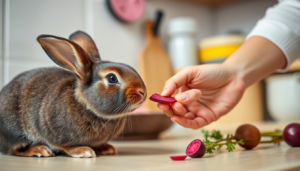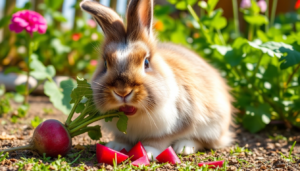Rabbits are gentle pets that need a specific diet to stay healthy. It’s important to make sure their food is both nutritious and safe. The main parts of a rabbit’s diet are hay, pellets, and leafy greens. However, many rabbit owners wonder if they can include other vegetables and fruits, like beetroot. This article will discuss whether beetroot is safe and beneficial for rabbits, looking at its nutritional benefits, safety tips, and the best way to serve it.
Nutritional Benefits of Beetroot
Beetroot is a vegetable full of important vitamins and minerals. It has lots of vitamin C, vitamin B6, and folate, along with minerals like potassium, magnesium, and iron. Beetroot also has a lot of dietary fiber, which helps keep a rabbit’s digestion healthy. The antioxidants in beetroot, like betalains, help overall health by fighting oxidative stress and reducing inflammation.
For rabbits, the fiber in beetroot helps keep their gut healthy and can prevent a serious condition called gastrointestinal stasis. The vitamins and minerals in beetroot support many body functions, like immune health, energy, and nerve function. However, beetroot should be given in moderation because its sugar content can be harmful if given in large amounts.

Is Beetroot Safe for Rabbits?
Beetroot is generally safe for rabbits if given in small amounts. The key is to feed it in moderation and prepare it properly. Because beetroot has high sugar content, it can cause digestive problems if rabbits eat too much. So, it’s best to give beetroot as an occasional treat, not a regular part of their diet.
When giving beetroot to your rabbit for the first time, start with a small piece and watch for any signs of digestive issues, like diarrhea or changes in appetite. Make sure the beetroot is fresh, clean, and free from pesticides. Always wash it thoroughly. It’s best to offer beetroot raw because cooking can reduce its nutritional value.
Beetroot should be given less often than other vegetables like carrots or leafy greens. Although it can be a healthy treat, giving too much beetroot can upset a rabbit’s balanced diet. Beetroot should only be a small part of a diet that is mostly hay, along with other safe vegetables.
How to Introduce Beetroot to Your Rabbit’s Diet
When adding beetroot to your rabbit’s diet, do it slowly to avoid digestive problems. Start with a small piece, about the size of a fingernail, and watch your rabbit for the next 24 hours. Check for signs of digestive issues like soft stools, diarrhea, or changes in eating habits. If your rabbit handles the beetroot well, you can slowly give a little more over time.

It’s important to introduce only one new food at a time. This way, if your rabbit has a bad reaction, you can quickly find out which food caused it. Keep the portions small and don’t give beetroot too often. Beetroot should not replace the main parts of your rabbit’s diet.
Serving Suggestions
When giving beetroot to your rabbit, it’s best to serve it raw to keep its nutrients. Make sure to wash it well to remove any pesticides or dirt. Cut the beetroot into small, easy-to-eat pieces to avoid choking and make it easier for your rabbit to eat.
The best portion size for beetroot is about one or two small pieces per serving, given once or twice a week. This way, your rabbit can enjoy beetroot without getting too much sugar. Mixing beetroot with other safe vegetables can help keep your rabbit’s diet varied and balanced.
Potential Risks and Precautions
Beetroot can be a healthy treat, but if not fed correctly, it can cause problems. Too much beetroot can lead to weight gain and dental issues because of its high sugar content. Giving too much beetroot can also upset your rabbit’s stomach, causing diarrhea or other digestive problems.
Don’t give beetroot leaves to rabbits because they might have harmful compounds. Always make sure the beetroot is clean and free from pesticides or chemicals that could hurt your rabbit.
Alternatives to Beetroot
If you want to add variety to your rabbit’s diet, there are many other safe vegetables you can try. Carrots, bell peppers, and cucumbers are good choices that offer different flavors and nutrients. Leafy greens like romaine lettuce, Cauliflower, Cucumbers, kale, and celery are also great and should be a big part of your rabbit’s diet.
Giving your rabbit a variety of vegetables helps keep their diet balanced and prevents them from getting bored. Each vegetable offers different nutrients that are good for your rabbit’s health.
Conclusion
Beetroot can be a healthy treat for your rabbit if given in small amounts. It has important nutrients like vitamins, minerals, and fiber that can help your rabbit stay healthy. However, because beetroot is high in sugar, it should only be given occasionally and in small pieces to avoid digestive problems and diet imbalances.
Start with a small piece and watch your rabbit for any negative reactions. Make sure the beetroot is clean and free from pesticides, and always serve it raw and cut it into small pieces to avoid choking.
Beetroot should be just one part of a diet mostly made up of hay, with other safe vegetables and leafy greens. A varied diet is important for your rabbit’s health and happiness. By following these tips, you can safely add beetroot to your rabbit’s diet as a tasty treat.

